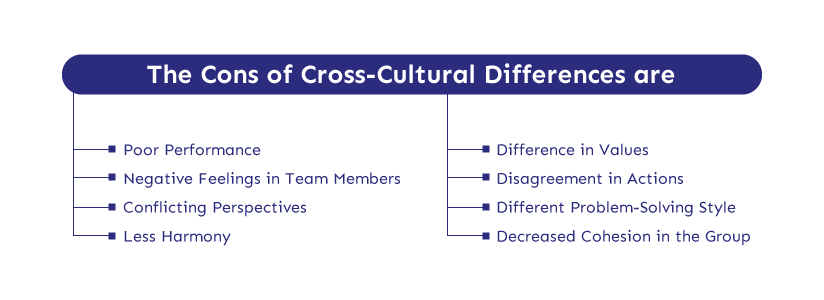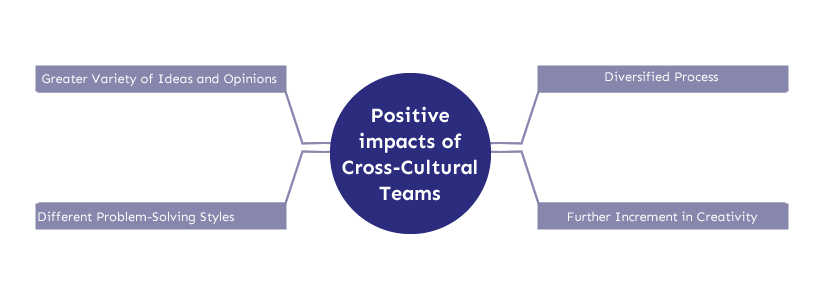How To Manage Cross-Cultural Remote Teams While Outsourcing

The coronavirus pandemic, like the internet, had disruptive effects on human life. And a screen full of colleagues is one of them. Once nobody thought the complete work strength of a multinational organization would work from home.
Now, everyone around the world was having zoom meetings instead of sharing ideas in the cafeteria.
While people have been freelancing for a long time, remote work in companies was new during the pandemic. And even after two years, many managers and team leaders still struggle to glue their teams together. This is more true for cross-cultural teams spread across the world.
MNCs and big brands operate globally and have the best minds working on a problem from across the world. Sometimes they outsource the work to an offshore software development company where people have different beliefs, communication styles and ways of expressing themselves.
That is why sometimes, even the exact words have completely different meanings for two team members.
In this blog, we will see how the cultural variations run deep into managing a cross-cultural team while outsourcing.
What are cross-cultural teams?
Cross-cultural teams have people from across the globe working together on a project. They have unique perspectives, thinking patterns, productive habits, and experiences.
While pandemic has brought the working world far closer than ever, there is still a lack of understanding about the functioning of a cross-cultural team while outsourcing a project and how to lead one.
Let’s elaborate on an example.
Imagine an outsourcing team has personnel from 10 different nationalities. You used a simple phrase during a meeting like “you are killing it over there.”
It is a compliment, but it can be perceived as unfavourable if someone is not familiar with the context. It is positive feedback for your team members from the USA, UK, Australia and other English-speaking countries.
But someone who is not from the same culture or geography can interpret it as something terrible.
Such anecdotes are an everyday affair in outsourcing teams operating across continents. In the software consulting teams where IT professionals work with clients worldwide, project managers have to develop an understanding of different cultures and act accordingly.
How do cultural differences impact cross-cultural teams in outsourcing?
As a project manager or executive, you must have faced this situation during a project where you shared an idea, and one of the team members is convinced it’s the best way to go about it. But others might not think so; they might say it’s not going to work or are in the not-so-sure zone. You must have had all the different flavours of reactions in between.
This is common in outsourced cross-cultural teams where employees come from different parts of the world.
There are different ways organizations deal with this; some of them recognize that such cultural differences exist, while others keep on working without ever formulating its effects. Cultural differences profoundly impact an employee’s performance, collaborations, interactions, mindset, motivation, decision making, and more.
With so much outsourcing for software development, web development, customer service, and all other services, even small businesses are going global.
Hiring a workforce from various cultural foundations has many advantages for companies, including creativity, a difference of opinion, perspective, problem-solving capacity and more.
Also Read: Web Application Development: A Complete Guide
On the flip side, there are grounds for misunderstandings among team members too, which can gradually lead to fostering negative emotions affecting their individual performance as well.
Every human being has a deep desire to be understood by others. Cross-cultural teams are profoundly affected when such a basic need is not met in close proximity. And, in turn, the integrity and impact of the project itself.

The impacts of cross-cultural teams are not always harmful; there are positive ones too. It is also true that teams with similar cultural contexts function more smoothly without gaps in understanding, policies and procedures.

5 breadths where cultural differences sprouts
Cultural differences are inevitable while hiring outsourcing teams. They run through different domains and contexts in remote working teams.
A research gate publication study finds that 76% of professionals believe cultural diversity influences multicultural remote teams. Such a vast percentage should not be ignored.
And even though the internet has a compact impact on outsourcing teams, the more important aspect is the cohesion, value orientation and whether they enjoy working together. Such intricate qualities can’t be changed in a day but definitely can be understood.
We will discuss some of them right here.
1. Contextual communication
Communication takes different forms, behavior and context across the globe. It has evolved in the outsourcing industry, but without the proper context, words don’t mean the same for all.
This is Because every culture has its ways of communicating and transferring thoughts which, when played together in outsourcing teams, can create friction.
Contextual communication in cross-cultural teams is of two types: low context and high context communication.
For instance, western cultures such as the USA and Australia are high context cultures known for their clear and precise communication.
So when talking to someone from low context cultures, managers should take time to explain things well.
In contrast, eastern cultures like Japan and South Korea have subtle forms of communication with more layers. It requires reading between the lines to understand what is meant.
When communicating with high-context cultures, members from low-context cultures should notice their body language and what they say as it creates a wholesome understanding of the individuals.
2. Feedback communication
Another difference in cross-cultural teams in the outsourcing industry is how they provide feedback.
Some cultures like Russia or Israel use a straightforward and descriptive communication style for feedback. They use upgrades and emphasize mistakes in front of the group.
This can be perceived as harsh and rude for cultures more adaptive toward indirect feedback formats like Japan and Indonesia. They use gentle feedback and downgrades using words such as kind of and maybe to get their message across, which is very different from direct criticism in other places.
In such cultures, criticism is communicated privately rather than publicly.
Also Read: How To Pick The Right Offshore Partner For Your SaaS Company
While exchanging feedback with the team members, it is best to be cautious if you are going for an open feedback protocol. Explain yourself well and gauge the members to understand how they are receiving it.
3. Confrontation
Some cultures promote open confrontation, while others have a passive approach.
For instance, French culture distinguishes the idea from the person, so open confrontation or feedback about the concept does not affect team members’ feelings or their relationships.
In countries like Japan, on the other hand, the person and ideas are tied. So questioning someone’s idea can be seen as a personal attack.
While running a cross-cultural team, you need to read the room before expressing your views on an idea because someone might take it upon themselves.
4. Expressing emotions
Some cultures are more expressive while others are not. You might find outsourced staff from Germany, France or Italy to have a very verbal disagreement about certain ideas. But not all intensive conversations are negative; it’s just how these folks get their information.
Emotions can be tricky and hard to decode when managing a cross-cultural team while outsourcing. Not everybody has the same responses to feedback. To ensure that your intention is well reflected on every team member, take some time to explain and clarify if you sense any negative emotions harboring.
5. Commitment to time and tasks
Again cross-cultural diversity impacts many dimensions and verticals in running international teams. Commitment and time required to complete a task are one of them.
For instance, in some cultures like Germany, the workforce focuses on one task before moving to the next and works chronologically. While in countries like Saudi Arabia, multitasking is appreciated. Here professionals juggle multiple projects and assignments because being adaptive is respected.
Also Read: Offshore Software Development Trends For 2022 (One’s You Can’t Miss)
Handling multiple projects simultaneously may not always be the best strategy in business, but sometimes it’s a need. Here the managers must see how their multicultural team sees through the projects and complete them on time.
5 strategies to handle cross-cultural remote teams while outsourcing
So, if there is a secret to making your cross-cultural team an understanding flywheel, why wouldn’t managers want it?
So let’s dispel the darkness around managing cross-cultural remote teams while outsourcing and see how people from diverse backgrounds bring creativity and freshness to work.
1. Invest time to know your team members
Don’t just have a hiring interview and assume you know your remote team. Take more time to learn about their career stories and journey so far. How did they reach this level of expertise, what motivates them, what drives them, their communication style, what are their best skills, what’s the best way to incentivize them and more.
This will help you understand their personality and assign tasks per their temperament. Create a rapport with each team member, and be genuinely interested in them. And your team members will reciprocate that with you and others.
2. Adopt a flexible approach to deadlines
One key factor of working in a team is scheduling and meeting deadlines. Understanding the linear and flexible time construct for task completion also helps set priorities which can go a long way.
Another aspect where flexibility should be applied is following the hierarchy.
Some people come from hierarchical cultures like China, and Mexico, while others have an accessible approach. Disrupting a senior during a presentation might seem normal for someone from the USA, which is wild for someone from a hierarchical culture.
A flexible approach is never a bad strategy when managing cross-cultural remote teams. You can never go wrong with flexibility.
3. Be an active listener
Don’t make false conclusions about your team and let them govern your decision-making; like the German squad is too upfront, the UK team wastes time, and the South Korean team are not good with deadlines.
Such biases can have a severe impact on trust and disrupt collaboration. Rather than forming opinions on why certain teams operate differently, try to understand their viewpoints. Looking through their circumstances, local cultures, and considerations will lead to friction-free teamwork.
Asking questions and listening to your team members will develop the insights to motivate and move teams with various mindsets.
4. Promote transparency in communication
An open communication strategy always works. Promote cross culture team members to share their opinions and eradicate any feelings of dominance and unappreciation in the group.
Also Read: Hiring Offshore Software Companies In 2022? Here Are The Top Models To Pick From
When planning projects and crafting proposals virtually, plan meetings to ensure everyone is updated with other members’ opinions.
5. Organize cross-cultural awareness exercises
Make it a part of team nurturing exercises to educate about cross cultures in the group. Training and awareness exercises can include sessions on various culturally diverse behaviors, business etiquette, and greeting customs.
This will help to demystify the tension and enable your remote team to embrace cultural differences rather than putting them on the back burner. Cross-cultural exercises will help you run global teams and foster resilient relationships with clients and customers worldwide.
The distillation
Being born and raised in different environments and influences, people develop in various ways. From the low context, direct confrontation German folks to high context, more emotional expressive US mates.
Running a remote team with people from different nationalities requires an understanding of various cultures, their way of communication and an inclusive approach. Once you get the words to mean the same thing in the same context, your job is done.
Use the advice to run your outsourcing teams worldwide and see the magic happens.
If you are looking to hire remote teams for software, web, mobile or game development, contact us. Our offshore software development company provides experienced and adaptable staff for clients worldwide.
Similar Posts

Leveraging .NET Consulting Services for Enhanced Project Outcomes
Have you ever wondered how businesses can gain from .NET consulting? Dot NET is an effective device that allows the construction of all styles of software, from websites to apps. It has ended up being a key participant in software program development as it makes creating apps fast and green. Lots of businesses use .NET […]...

Unlocking Offshore Development Insights Of India In 2024
Wondering how tech giants survive in this competitive era keeping an eye on cost-cutting and high-level solutions? Yes, the answer is offshore development, where countries like India are filled with excellence, creativity, and cost-effectiveness. Also, are you aware that India acquires approximately 55% of the global market share in offshore services, making it a dominant […]...

Global Outsourcing Problems Business Encounters and How to Solve Them
Outsourcing a software project for business owners is confusing at first. They are overwhelmed with the options, elaborated details, and the constant search for an ideal partner. ...









